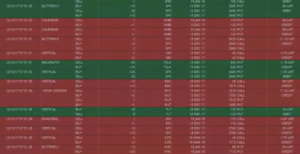 Ask any veteran trader, and they’ll let you know that stock scanners have changed everything. Things that used to take traders three to four hours can now be done in a matter of minutes with a few clicks of a button.
Ask any veteran trader, and they’ll let you know that stock scanners have changed everything. Things that used to take traders three to four hours can now be done in a matter of minutes with a few clicks of a button.
Identifying trading opportunities used to be a monotonous and tedious task, especially with so many charts to view and stocks to watch. Once the markets opened, the only there was for you to do was to hope that your sights were on the right stocks. There was no one to tell you or point you to where the action was hottest.
But those days are long gone. With the advent of stock scanners, all the heavy lifting is now done for you. Here is what you need to know about the world stock scanning.
Stock Scanners: What Are They?
Stock scanners are software that can, almost instantly, look through countless stocks searching for the criteria you are trying to find. If you ask the software to find stocks that are making all-time highs on abnormally higher-than-average trading volumes, it scours the markets and presents you with every stock inventory that meets your criteria.
So, you see, without a scanner, you would have to go through an endless stream of stock charts until your eyes bleed. Scanners save you the effort and time while allowing you to focus on the trading opportunities you consider a priority. These scanners are a game-changer, and every trader should have one.
Stock Screeners
If you have been in the markets for a while, chances are you have also heard the term stock screener. But what is a stock screener? Is there any difference between it and a stock scanner? Let’s have a look.
While the two terms are somewhat interchangeable, there are, to a certain technical extent, some differences between screeners and scanners. It all boils down to the effectiveness of scanning time frames.
Stock screeners were first developed when the internet was still in its early stages of infancy. Most screeners were websites where one would log in, especially around the evenings, and scan the markets for basic criteria like stocks that were above a specific moving average. They were quite low-tech and were generally used for long-term trades.
Stock scanners came about as technology and the internet evolved. They are more-powerful programs that are installed on internet-connected computers and scan the markets for trade opportunities in real-time.
Picking a Stock Scanner
With tons of stock scanners available on the market, it can be tough to pinpoint a scanner and claim it is the best. The option you choose will all depend on you – your trading strategy and style, market access requirements, technological needs, your budget, and other factors.
Stock scanners are available in different options. Some are point-and-click (to start scanning, all you need to do is click a few buttons), while others are a bit more complex and will require that you have statistical knowledge and programming skills.
One thing you might have to consider when looking for a stock scanning program is the amount of computing power you have. Some scanners can be run via an internet browser, but if you are looking for something a bit more intense, then desktop-based scanners are what you should get. However, it is worth noting that to run such scanners, you’ll need a powerful computer.
Another thing that you will need to consider is cost. Costs vary with the type of software you want, with prices ranging from hundreds to thousands of dollars. For some of these scanners, you might have to pay the cost upfront to get the software while for others, you pay a flat monthly fee to use the software.
There is so much that we could talk about when it comes to picking a stock scanner, but with so many differences between the scanners available on the market, the important thing is that you go for a scanner that best suits your style of trading.
Parting Shot
Regardless of the stock scanning program you use, you must have an idea of the stock criteria you want the program to search. It may be a recent momentum, P/E ratio, or chart pattern – whatever it is you decide in your ultimate trading plan.